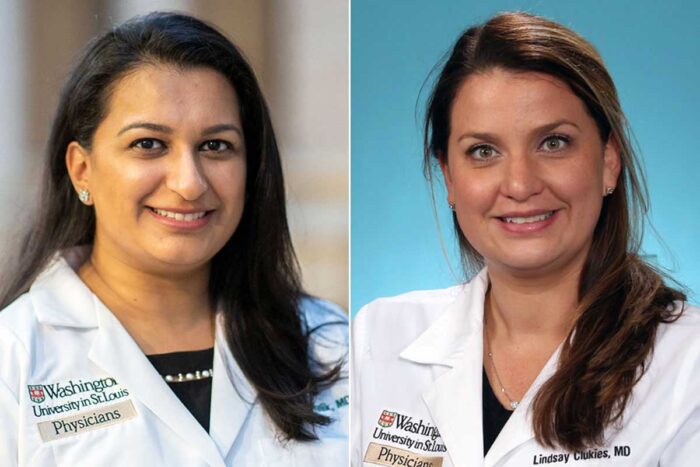Clukies, Malik named Loeb Teaching Fellows
Will focus on firearm safety, enhancing anatomy education through radiology
 Washington University
Washington UniversityMariam Malik, MD, an assistant professor of radiology, and Lindsay Clukies, MD, an assistant professor of pediatrics, have been named the 2023-25 Carol B. and Jerome T. Loeb Teaching Fellows at Washington University School of Medicine in St. Louis.
Lindsay Clukies, MD, an assistant professor of pediatrics, and Mariam Malik, MD, an assistant professor of radiology, have been named the 2023-25 Carol B. and Jerome T. Loeb Teaching Fellows at Washington University School of Medicine in St. Louis.
The fellowship program was established in 2004 with a gift from Carol B. and Jerome T. Loeb to advance medical education. The program also is supported by The Foundation for Barnes-Jewish Hospital. The two-year fellowship provides recipients extra time to focus on implementing innovative ideas to enhance the education of medical students and residents.
“The tangible impact that the Loebs’ benevolence has had on the culture of medical education at Washington University cannot be overstated,” said Eva Aagaard, MD, vice chancellor for medical education, senior associate dean for education, and the Carol B. and Jerome T. Loeb Professor of Medical Education at the School of Medicine. “Drs. Clukies and Malik have put forth truly innovative proposals that I believe help to transform medical education and ultimately the health of our community, exactly as the Loeb family intended.”
Clukies, who also serves as the associate trauma medical director at St. Louis Children’s Hospital, has proposed a “safe storage project” curriculum to help mitigate firearm injuries. The project aims to ensure that pediatricians have the necessary knowledge and comfort level to talk to patients about firearm safety, including safe storage recommendations and techniques.
Firearm-related injuries are a public health epidemic, with such injuries recently becoming the No. 1 cause of death for children and adolescents over age 1. Despite such statistics, this type of pediatric injury remains one of the most undermanaged public health conditions, and health-care trainees often lack the education to help prevent and treat these types of injuries.
“The most commonly cited barriers for discussing firearms and firearm safety include lack of training, knowledge and familiarity with prevention programs, and comfort level with these discussions,” Clukies said. “I intend to address barriers and compliance with what pediatricians know is best practice to impact this public health epidemic. Pediatricians are responsible for talking to all patients about firearm safety, and my project aims to give pediatricians the skills necessary for this responsibility.”
Malik will develop interactive learning activities that combine anatomy and radiology instruction to be used throughout the School of Medicine’s Gateway Curriculum. Using innovative educational methods and technology, the ultimate goal of the program is to improve medical students’ understanding of foundational anatomy via practical application in radiology.
The program could improve performance on medical school assessments and help build student skill sets for future medical practice.
“Students can use their enhanced anatomy knowledge to grow their skill sets in multiple ways,” Malik said. “Practical application of radiology into the preclinical anatomy course can improve student performance. Anatomical knowledge is foundational for medical students going into any specialty, and students will get the chance to build upon this foundation in their understanding and care for future patients.”






